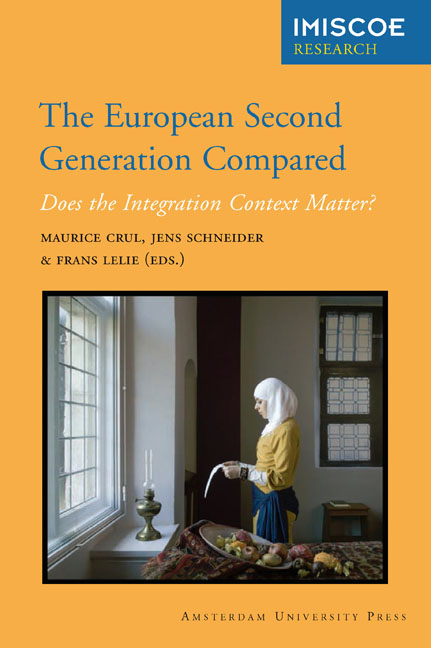Book contents
- Frontmatter
- Contents
- Acknowledgements
- 1 Introduction
- 2 Comparative Integration Context Theory: Participation and Belonging in Diverse European Cities
- 3 Research Methodology
- 4 The TIES Respondents and their Parents: Background Socio-Demographic Characteristics
- 5 School Careers Of Second-Generation Youth in Europe: Which Education Systems Provide the best Chances for Success?
- 6 Assessing the Labour Market Position and Its Determinants for the Second Generation
- 7 Union Formation and Partner Choice
- 8 Identities: Urban Belonging and Intercultural Relations
- 9 Ways of ‘being Muslim’: Religious Identities of Second-Generation Turks
- 10 Conclusions and Implications: The Integration Context Matters
- List of Contributors
- Other IMISCOE titles
10 - Conclusions and Implications: The Integration Context Matters
Published online by Cambridge University Press: 09 January 2021
- Frontmatter
- Contents
- Acknowledgements
- 1 Introduction
- 2 Comparative Integration Context Theory: Participation and Belonging in Diverse European Cities
- 3 Research Methodology
- 4 The TIES Respondents and their Parents: Background Socio-Demographic Characteristics
- 5 School Careers Of Second-Generation Youth in Europe: Which Education Systems Provide the best Chances for Success?
- 6 Assessing the Labour Market Position and Its Determinants for the Second Generation
- 7 Union Formation and Partner Choice
- 8 Identities: Urban Belonging and Intercultural Relations
- 9 Ways of ‘being Muslim’: Religious Identities of Second-Generation Turks
- 10 Conclusions and Implications: The Integration Context Matters
- List of Contributors
- Other IMISCOE titles
Summary
Introduction
Throughout this book, we pursued several lines of comparison across countries, between and across cities and for multiple origin groups. We found major differences between groups as well as remarkable variation within the same origin group across cities and countries. In our conclusion, we make use of the preceding chapters’ various outcomes to look at one origin group in more detail. For this purpose we selected second-generation Turks, as they are significantly present in seven of the eight countries that the TIES survey covered. This group's ubiquity enabled robust comparison and, at the same time, contemplation on the integration context and its specific bearing on the second generation as a whole.
Deviating from our approach in others chapters, here we focus on absolute differences between Turks across countries rather than relative differences between this group and respondents of native-born parentage. Our aim is to assess what kind of context best affords opportunities for the Turkish second generation's upward mobility. We seek to pinpoint what helps them succeed and what hinders them across countries.
The sometimes major variation in outcomes provides evidence that integration contexts across countries and cities offer radically differing opportunities. This realisation ushers in new explanatory factors and takes some weight off individual or group factors. As the previous chapters showed, the contextual conditions created by institutions (e.g. arrangements in school and on the labour market, citizenship and welfare policies) are of paramount importance.
However, we do not mean to totally dismiss the impact of individual and family characteristics. Several chapters in this volume underscore, for example, the relevance of parental background characteristics. Yet, the impact of individual and family-related factors often only becomes apparent in the interplay of specific conditions of the local and national integration contexts. This chapter therefore casts the spotlight on the integration context and its interplay with available resources in the family.
A comparison of second-generation Turks with loweducated parents across seven countries
Much of the variation we see between countries is rooted in general macrolevel institutional differences in the structure of the labour market or how educational systems are organised. The aforementioned interplay of contextual conditions only comes to the fore when meso- and micro-levels are also considered.
- Type
- Chapter
- Information
- European Second Generation ComparedDoes the Integration Context Matter?, pp. 375 - 404Publisher: Amsterdam University PressPrint publication year: 2013



